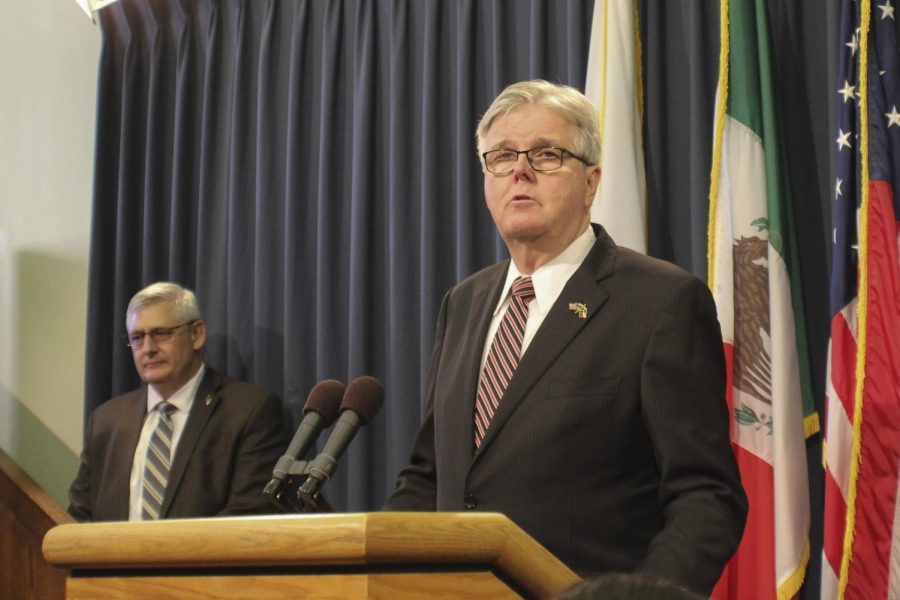Dan Patrick’s plan to end tenure has yet to come to fruition, but some Texas lawmakers are targeting class curriculum
Lt. Gov. Dan Patrick gives a speech at the Texan Capital on Feb 18, 2022. He addressed critical race theory and pledged to eliminate tenure for new hires at Texas public universities.
February 12, 2023
Lt. Gov. Dan Patrick announced last February that ending tenure in public universities would be a “top priority” this legislative session, but Texas lawmakers have yet to file a bill attempting to do so.
Patrick’s call for the end of tenure is part of an effort to end the “academic freedom” created by tenure, which he claimed allows critical race theory to be taught. His announcement came after UT’s Faculty Council passed a resolution supporting professors teaching about critical race and queer theories last February.
“I am outraged by the University of Texas at Austin’s Faculty Council’s 41-5 vote on a resolution in support of teaching critical race theory, and I am further outraged that the Faculty Council told the legislature and the UT Board of Regents that it is none of their business what they taught,” said Patrick at a Feb. 18, 2022 press conference. “Universities across Texas are being taken over by tenured, leftist professors, and it is high time that more oversight is provided.”
In a letter to faculty members, UT President Jay Hartzell said, “a first-class university requires first-class faculty.” He said removing tenure would “cripple” UT’s ability to attract and retain faculty and students.
“(Removing tenure) would also hurt Texas students, who would not be able to stay in state knowing that they will be learning from the very best in the country,” Hartzell said.
Currently, Texas lawmakers have not filed a bill aiming to end tenure, but a handful of bills have been filed addressing issues that sparked Patrick’s want for increased oversight of university faculty.
House Bill 1006
Rep. Carl Tepper (R-Lubbock) filed HB 1006, which would make changes to the language of the Texas Education Code. For example, the bill stipulates a language change saying public universities would “permit the diffusion of culture” instead of “transmit culture through general education.”
The bill would prohibit public universities from funding offices of diversity, equity and inclusion, claiming they provide services “beyond what is necessary to uphold the equal protection of the laws under the Fourteenth Amendment.”
The bill includes a clause that permits citizens to sue public universities they think are not compliant, similar to Texas’ latest abortion law. If a university loses a lawsuit, it must pay the legal fees of the litigation.
House Bill 1046
HB 1046, also filed by Tepper, would prohibit public universities from requiring prospective students or employees to state their personal political beliefs, including “ideolog(ies) or movement(s) that promotes the differential treatment of any individual or group based on race or ethnicity.”
The bill also mentions blocking DEI offices on university campuses.
House Bill 1607
Rep. Cody Harris (R-Palestine) filed HB 1607, which lists multiple topics or statements universities cannot include in their curricula. These items are closely tied to racial and gender identities and their place in American history and society. For example, the law would prohibit universities from teaching that individuals “bear responsibility, blame or guilt” because of their race or ethnicity.
If passed, universities that include the listed topics in their curricula will not be eligible for state funds, a rule enforced by the Texas Higher Education Coordinating Board.



